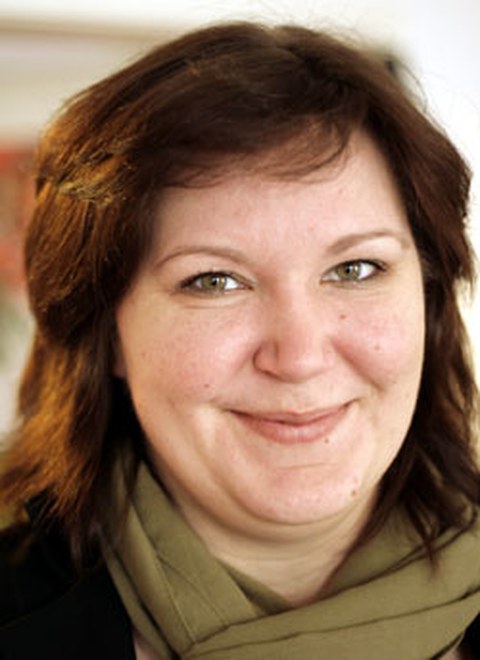From chance hit to bullseye
(Interview from 2008)
Dagmar Möbius
When the German Democratic Republic (GDR) started to crumble in 1989, Sabine Friedel was only 15 years old and spokesperson for the Freundschaftsrat (the GDR youth movement schools council) at her school. However, she cites a much later date as the start of her political activity. "I didn't see my involvement as political back then." Not even when she lost her place as a trainee nurse after reading out an appeal from the New Forum at school in September 1989. "That was part of the turmoil of the reunification years," she says without rancor.
She then briefly explored the work of the United Left (Vereinigte Linken) group and remembers an event with Wolf Biermann with a smile. "I was allowed to hand him a glass of water on stage, it was great." But after that, her involvement in the left-wing group "faded away."
After 10th grade, she completed a year of basic vocational training in business and administration before deciding to pursue her Abitur high school diploma after all. Sabine Friedel would actually have liked to study physics. "I've always been interested in the subject, but even though I had a great physics teacher, I didn't think I was good enough for a physics degree," she says, adding, "when I enrolled at TU Dresden, I looked down the list of subjects and my eye caught on political science; it was a coincidence." Why she wanted to study in Dresden was clear: "I was born here, my sister studied in Dresden, I knew the area and I was able to keep my circle of friends."
Sabine Friedel ultimately studied political science, sociology, and law. A chance choice rapidly turned into genuine interest. Looking back, she says that "the 'chance hit' was a bullseye." She studied from 1993 to 2001 and got involved in the department student council. She spent an entire academic year at the famous New School for Social Research in New York. This was possible thanks to an exchange program at the TU Dresden Faculty of Arts, Humanities and Social Science. The program ran for the second time in 1996, and participants received a DAAD scholarship. Only three students in each year group could go to New York, so Sabine Friedel "studied really hard in the first six months." In the second half of the year, she chose "things I enjoyed, like local politics," took an internship with UNICEF, and volunteered with a homeless charity.

Sabine Friedel
She says her degree was useful, although she does have one caveat. "It is not as if real politics has anything to do with political science." However, she learned how to think, how to analyze texts and situations, and how to formulate hypotheses and options.
For a long time, Sabine Friedel was convinced that political scientists had to be neutral. "At some point, however, it occurred to me that those are two different things." In 2000, she joined the SPD, took part in parliamentary group meetings, and gradually familiarized herself with the work of the political party. "I wanted to understand how the SPD operates," she tells us.
The practical life skills her degree did not teach, such as knowledge of rhetoric and negotiation, facilitation and presentation, she acquired outside university. Those skills have been very useful to her, and not only in her role as personal assistant to the mayor of Dresden from 2001 to 2003. In 2003, Sabine Friedel returned to the Institute of Political Science at TU Dresden as a research associate. She still holds a part-time post there, teaching classes, introductory courses in local and state politics and practical seminars.
Sabine Friedel may "just" have a part-time job, but she couldn't be busier. In January 2008, she was elected head of the Dresden SPD. She does not agree that her career in the party has been a steep rise, but she does say that she is "sure it would have taken longer in other states." With meetings of various bodies and committees of the city council and party, there is hardly a free evening. Time for her personal life is rare. So it's a good thing that her husband Andreas, a former fellow student, shares not only his life with her, but also the same working hours at the "Genossenschaft" office in Dresden's Neustadt district. Sabine, Andreas and a group of friends founded a boules club a year ago, which has now even set up a winter boules hall in a local industrial estate. "Unfortunately, I don't get there nearly often enough," she says regretfully.
Nonetheless, we believe Sabine Friedel when she says the line between politics and hobbies is blurred. She makes no secret of her vision for the future. "In 2015, I would like to be Dresden's deputy for general administration." During her time at City Hall, she says she understood why administrations work the way they do. "It was a fascinating period. On the one hand, there are many good employees, but on the other hand, many processes are organized in such a complicated way that the public perceives the administration as unfriendly." She would like to change that and she does not want to leave this to chance. Sabine Friedel may just score her next bullseye in Dresden's City Hall.
Contact:
Sabine Friedel
Bürgerbüro „Die Genossenschaft“
Prießnitzstr. 22
01099 Dresden
Email: Sabine Friedel
Web: Sabine Friedel
